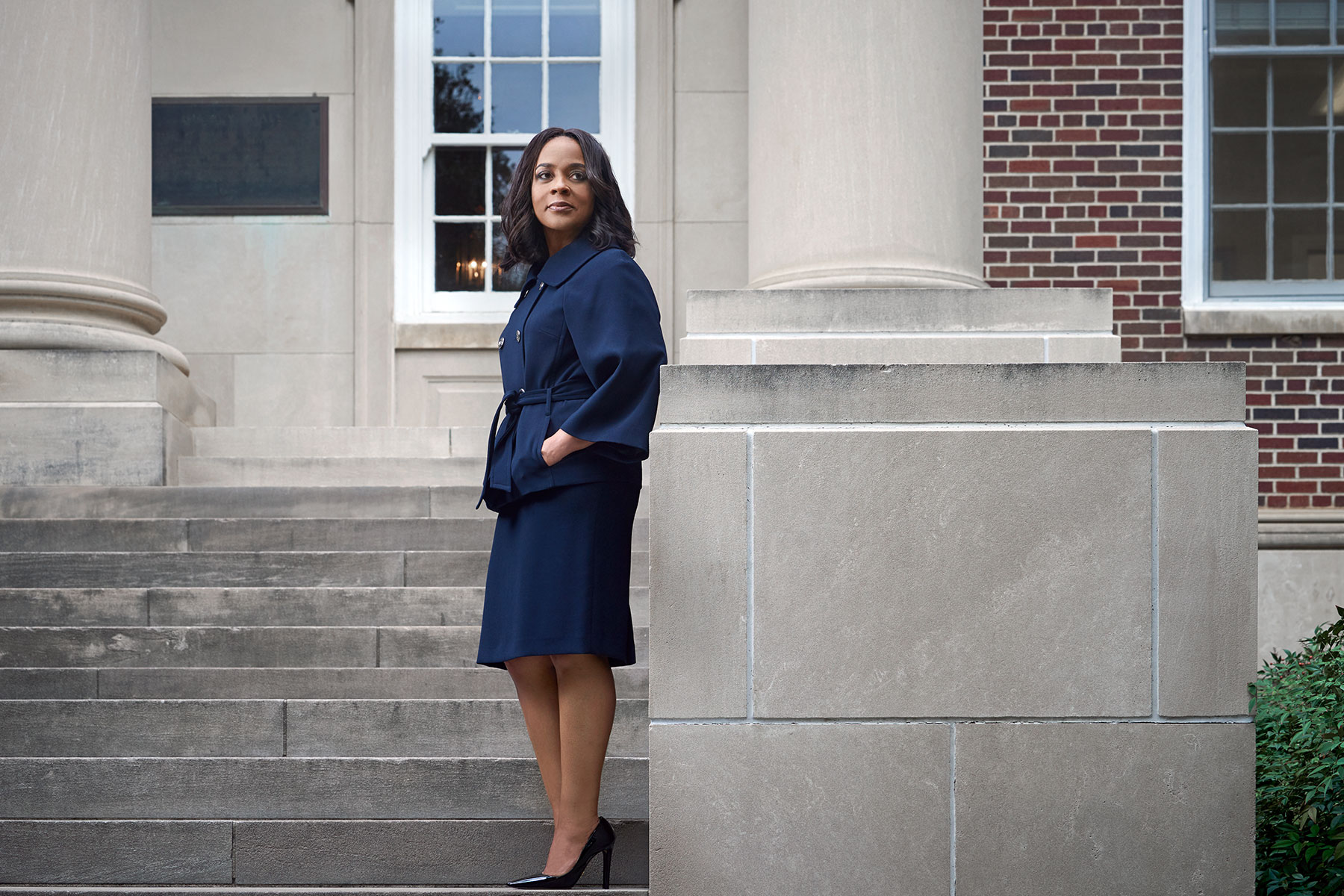Andrea Williams was among the first to arrive at the civil courthouse in downtown Dallas on a rainy fall morning, needing help. She sat on a wooden bench, a stack of legal papers on her lap, her leg pumping restlessly as she waited. The 59-year-old had left a homeless shelter that morning to seek free legal advice at a clinic run by law students from SMU. She wanted to file for divorce, but the cheapest lawyer she could find charged $1,500. She’d tried to go it alone but got overwhelmed by the petitions, affidavits, and deadlines. A friendly librarian had given her a flyer about the clinic, held once a week at the George L. Allen Sr. Courts Building.
Just after 9 am on that Friday morning, a clean-cut, 24-year-old student, Spencer Page, walked into the hallway wearing his only suit jacket, a navy blazer from J.Crew. He looked around at the half-dozen people and called out, “Who was here first?” Williams raised her hand as Page walked over and smiled. “What can we help you with today?”
Every week, a self-help desk run by the VanSickle Family Law Clinic at SMU’s Dedman School of Law assists dozens of Dallas residents who want to file for divorce, secure restraining orders, or modify child custody agreements. It’s one of the few resources available to people who can’t afford their own attorneys for civil litigation.
“These law students are helping us immensely,” says Judge Tena Callahan, family court judge in the 302nd district. “Their services are crucial.”
Several hundred people arrive at the court’s law library every week asking questions of clerks who can’t offer legal advice, Callahan says. The majority of queries involve family law and important life events: how do I get a restraining order against my abusive husband? How do I get child support to help feed my kids?
A group of judges, attorneys, and law school deans met about a year and a half ago to brainstorm solutions, and SMU stepped up. Their help desk, in its second tour, is staffed for about 16 weeks at a time by students who work under the guidance of professor Chante Prox Brantley. They are a tiny few of SMU’s hundreds of aspiring lawyers, most of whom dream of careers as hard-charging prosecutors or in the more lucrative arena of Big Law. In the hierarchy of legal ambitions, family law ranks somewhere near the bottom, with ambulance chaser. Their classmates often ask: “Are you sure you want to do family law?”
“I really want to help people,” says Jourdan Dukes, a 26-year-old from Dallas and third-year law student. “It’s hard work, but it’s important. Corporate law—keeping rich people rich—doesn’t call to me.”
For the students, the clinic has been a crash course in emotional clients. “I interned for a judge two summers ago who said, ‘Criminal law is dealing with the worst people at their best. Family law is dealing with the best people at their worst,’ ” says 24-year-old Liz Feeney. “People are so traumatized. Often they’re hanging onto the idea that they want their family to be whole again, which may not always be the best thing.”
Funded by a $4 million endowment, the pro se project is a part of Brantley’s family law seminar, requiring twice-a-week classes and another 18 hours of legal work. The students typically handle only uncontested matters, helping self-represented litigants fill out forms relating to divorce and child custody disputes, and answering questions about the family law process.
Along with the self-help clinic, the law students take on some clients. In one case, a student attorney spent an afternoon hurrying up and down the corridors of the courthouse searching for a judge to sign an emergency protective order; other students wrestled with the ethical dilemma of watching a client lie on the stand. They’ve learned that settling property and custody disputes for many people isn’t driven by logistics, but by emotion.
“I hate to stereotype, but I’ve noticed that the women we deal with often come in and say, ‘I want everything. I want the house and the car and the kids and every dollar that comes into his bank account,’ ” says 25-year-old Valencia Campbell. “And they don’t necessarily want it because they need it to survive. They’re hurting and they want him to hurt, too.”
Inside the courtroom on that fall morning, the first client of the day, Williams, took a seat at a wooden table. She already had filed her petition for divorce, but was uncertain about next steps. “Thank God you guys are here,” she told two of the students. “They gave me 40 sheets of paper to file, and I can’t make heads or tails of it.”
Law student Feeney looked over her petition. “OK, what we need to do now is a motion for citation.” Williams needed to make sure her husband was aware that she had filed for divorce, but she didn’t know where to find him. They’d have to submit an affidavit saying so.
“And then what happens?” Williams asked.
“Then they’ll post it,” Feeney said.
“What’s a posting? Where does it go?”
“In the courthouse. That counts as serving him,” Feeney said. She handed over a form, a Motion for Citation by Posting, and Williams began filling it out.
As they worked, people kept filing into the courtroom for help. By 9:30, about 16 waited on benches to talk to students. In each case, professor Brantley evaluated their work and made corrections.
After about 30 minutes, Williams rose from her seat and reached her hand across the table. “Thank you so much,” she said. “I really can’t tell you how much I appreciate it.”
For many of the students, the gratitude of the clients has solidified their commitment to family law. One litigant told them recently, “I have been up to the courthouse eight times trying to figure this out, and you guys helped me in 10 minutes.” The clinic, Callahan says, is a small step toward addressing an overwhelming need. There’s talk among county officials, commissioners, and nonprofits of hiring a bank of pro bono attorneys, improving access to legal aid, and adding clinics by other law schools.
“We can’t fix the fact that somebody doesn’t have any money,” Callahan says. “But we can fix the fact that they’re not getting appropriate legal services from the county. It’s our problem to fix.”
In the meantime, SMU’s law students are helping everyone they can, one Friday morning at a time.







